 15 citations,
January 2019 in “Journal of the Formosan Medical Association”
15 citations,
January 2019 in “Journal of the Formosan Medical Association” Adalimumab helped control a child's severe eye disease when other treatments failed.
 6 citations,
July 2018 in “JAMA facial plastic surgery”
6 citations,
July 2018 in “JAMA facial plastic surgery” Injecting minced fat into the facial artery can cause severe eye problems and death, more so than other fat types, and larger amounts increase these risks.
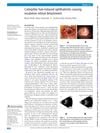 July 2022 in “BMJ Case Reports”
July 2022 in “BMJ Case Reports” Early treatment is crucial to prevent severe eye complications from caterpillar hair.
[object Object] 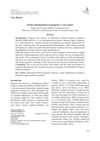 July 2020 in “Nepalese journal of ophthalmology”
July 2020 in “Nepalese journal of ophthalmology” A boy with progeria had eye problems and signs of aging like hair loss and skin wrinkling.
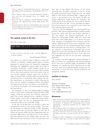 April 2016 in “British Journal of Dermatology”
April 2016 in “British Journal of Dermatology” Eyelashes are important for looks and eye protection, and more people are treating sparse eyelashes; more research is needed to understand eyelash biology and improve treatments.
 31 citations,
November 2014 in “Investigative Ophthalmology & Visual Science”
31 citations,
November 2014 in “Investigative Ophthalmology & Visual Science” A natural steroid in the body may protect against eye damage in glaucoma.
 23 citations,
February 2004 in “Clinical and Experimental Ophthalmology”
23 citations,
February 2004 in “Clinical and Experimental Ophthalmology” A boy with chromosome 13q deletion syndrome developed eye cancer, a woman with breast cancer lost vision due to a rare side-effect of her treatment, a man's vision worsened after using a hair loss drug, and two rare disorders were discussed. Optical Coherence Tomography is useful for diagnosing and monitoring these conditions.
 19 citations,
April 1995 in “Clinical Genetics”
19 citations,
April 1995 in “Clinical Genetics” Two siblings were the first reported cases of inheriting both eye coloboma and loose anagen syndrome together.
 16 citations,
September 2016 in “Neuropharmacology”
16 citations,
September 2016 in “Neuropharmacology” Activating TSPO helps protect the retina from damage caused by high eye pressure in glaucoma.
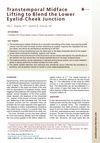 13 citations,
November 2014 in “Clinics in Plastic Surgery”
13 citations,
November 2014 in “Clinics in Plastic Surgery” The transtemporal midface lift improves the lower eyelid and cheek area with high patient satisfaction and low complication rates.
 13 citations,
February 2004 in “Clinical and Experimental Ophthalmology”
13 citations,
February 2004 in “Clinical and Experimental Ophthalmology” A baby boy with 13q deletion syndrome had eye cancer, a woman's vision improved after stopping a breast cancer drug, a man developed cataracts from using Propecia, and a rare skin disorder called Lipoid Proteinosis was discussed. Also, a tool called OCT is useful for diagnosing macular diseases.
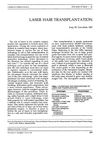 10 citations,
July 1997 in “Dermatologic Clinics”
10 citations,
July 1997 in “Dermatologic Clinics” Laser hair transplantation can be effective but should be limited to small areas and requires more training to ensure safety and effectiveness.
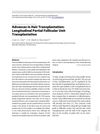 9 citations,
January 2015 in “Current problems in dermatology”
9 citations,
January 2015 in “Current problems in dermatology” New hair transplant method allows for hair regrowth in the donor area and less scarring.
 6 citations,
May 2013 in “PloS one”
6 citations,
May 2013 in “PloS one” The Foxn1(-/-) nude mouse shows disrupted and expanded skin stem cell areas due to high Lhx2 levels.
 5 citations,
June 2020 in “Experimental dermatology”
5 citations,
June 2020 in “Experimental dermatology” Redheaded people may have evolved to efficiently make vitamin D in areas with less sunlight.
 4 citations,
January 2015 in “International Journal of Trichology”
4 citations,
January 2015 in “International Journal of Trichology” Transplanted hair follicles can change and adapt to new areas of the body, with the immune system possibly playing a role in this adjustment.
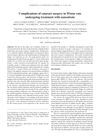 3 citations,
October 2018 in “Experimental and Therapeutic Medicine”
3 citations,
October 2018 in “Experimental and Therapeutic Medicine” Stopping tamsulosin one month before cataract surgery reduces eye surgery complications in rats.
[object Object]  3 citations,
July 2010 in “Archives of internal medicine”
3 citations,
July 2010 in “Archives of internal medicine” A woman kept her eyelashes during chemotherapy possibly because of her glaucoma eye drops.
 3 citations,
January 2008 in “Journal of the American Academy of Dermatology”
3 citations,
January 2008 in “Journal of the American Academy of Dermatology” A patient's skin rash did not affect the area where a previous viral rash was healing, suggesting a rare immune response.
 September 2016 in “Annals of occupational and environmental medicine”
September 2016 in “Annals of occupational and environmental medicine” Cleanroom workers in a battery factory have worse skin and eye conditions due to the very dry environment.
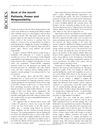 September 2003 in “Journal of the Royal Society of Medicine”
September 2003 in “Journal of the Royal Society of Medicine” The book is a useful reference for forensic medicine with some areas needing expansion for multicultural relevance.
 94 citations,
January 2007 in “Cutaneous and Ocular Toxicology”
94 citations,
January 2007 in “Cutaneous and Ocular Toxicology” Iranian veterans exposed to sulfur mustard suffer from long-term skin itching and eye damage, with some risk of skin cancer and ongoing management challenges.
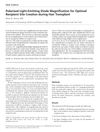 5 citations,
September 2005 in “Dermatologic Surgery”
5 citations,
September 2005 in “Dermatologic Surgery” Using a polarized LED magnifier during hair transplants eases recipient site creation and reduces eye strain but doesn't improve graft creation or placement.
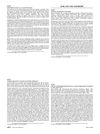 February 2010 in “Journal of The American Academy of Dermatology”
February 2010 in “Journal of The American Academy of Dermatology” Surgery on a baby with a skin disorder improved eyelid position and eye health.
 19 citations,
August 2011 in “Facial Plastic Surgery Clinics of North America”
19 citations,
August 2011 in “Facial Plastic Surgery Clinics of North America” Hair grafting is a key method for improving scars, especially in areas with hair, by transplanting hair to hide the scar while maintaining its original characteristics.
 7 citations,
August 2016 in “Nursing for Women's Health”
7 citations,
August 2016 in “Nursing for Women's Health” To prevent and treat Hair-thread tourniquet syndrome in infants, keep a close eye on their limbs, manage maternal hair loss, and educate parents and healthcare providers.
 2 citations,
January 2019 in “Medizinische Genetik”
2 citations,
January 2019 in “Medizinische Genetik” The document reports findings on genetic research, including ethical concerns about genome editing, improved diagnosis of mitochondrial mutations, solving inherited eye diseases, confirming gene roles in epilepsy, linking a gene to aneurysms, and identifying genes associated with age-related macular degeneration.
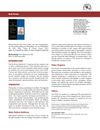 March 2015 in “Aesthetic Surgery Journal”
March 2015 in “Aesthetic Surgery Journal” The book is a valuable, comprehensive guide on hair transplantation, recommended for surgeons and students, with minor areas for improvement.
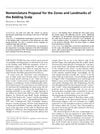 April 2001 in “Dermatologic Surgery”
April 2001 in “Dermatologic Surgery” Michael L. Beehner proposed a standardized naming system for balding scalp areas to help hair restoration surgery.
 336 citations,
August 2015 in “European Journal of Epidemiology”
336 citations,
August 2015 in “European Journal of Epidemiology” The Rotterdam Study found risk factors for elderly diseases, links between lifestyle and genetics with health conditions, and aimed to explore new areas like DNA methylation and sensory input effects on brain function.






























